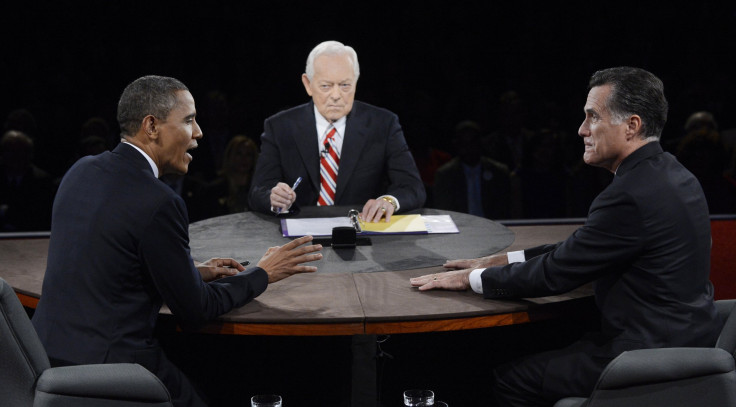US Pres Debate On Foreign Policy Left Things Unsaid

Presidential debates aren't a great venue if you're looking for nuance. Candidates are tasked with selling themselves to the American public, not with delving into policy specifics.
So while President Barack Obama and Mitt Romney clashed Monday night over their opposing records and visions for the future -- visions that were often difficult to differentiate from each other -- they eschewed or elided the larger, more complex picture on several of the topics that came up. Here's a few samples.
Staying in Iraq and Afghanistan: Romney and Obama clashed over whether the United States should have left more troops in Iraq, with Obama assailing Romney for wanting to leave troops in the country. Romney charged that the president had sought the same thing but fallen short.
In fact, Obama did fail to secure a "status of forces" agreement that would have allowed a residual force of up to 5,000 troops to remain in Iraq. Negotiations collapsed in large part because Iraq was unwilling to extend immunity to American soldiers.
Obama also repeatedly touted his effort to bring American forces home from Afghanistan, invoking the imperative of shifting away from the troubled country and beginning "nation building here at home." Romney backed the administration's 2014 deadline for withdrawing troops from Afghanistan.
Left unmentioned was the fact that a U.S.-Afghanistan pact, struck earlier this year, commits the United States to bolstering Afghanistan militarily and economically for years to come. Fully extricating the United States from its longest-running conflict will not be easy, and it won't happen by 2014.
Drones: President Obama has aggressively embraced the use of unmanned drones to strike potential terrorists, stepping up operations in the hinterlands of Afghanistan and Pakistan while expanding the drone campaign into Yemen and Somalia. While the administration refuses to admit that there have been any related civilian casualties, civil liberties advocates and the families of the dead beg to differ. Particularly troubling for critics is the fact that Obama authorized a strike that killed the radical cleric Anwar al-Awlaki, a U.S. citizen, without any judicial review.
But drones got only a passing mention in the debate. When Romney was asked about the tactic, he replied that, "I support that entirely, and feel the president was right to up the usage of that technology." Obama veered off into a talk on building partnerships in the region. (Such partnerships are useful for carrying out drones strikes -- a Wikileaks cable reveals since-deposed Yemeni president Ali Abdullah Saleh covered for the administration, promising to "continue saying the bombs are ours, not yours.")
Arab Spring: Romney accused Obama of having mishandled the popular uprising that swept through the Middle East; Obama responded by saying he was motivated early on, as when he called for the ouster of Egyptian president Hosni Mubarak, by the ideal that "America has to stand with democracy."
The citizens of Bahrain might disagree. The tiny nation is strategically important to the United States -- it hosts a naval base that is home to the U.S. Navy's Fifth Fleet -- and to nearby Saudi Arabia, which sees its Shiite monarchy as a bulwark against the nation's Sunni majority. So when Saudi forces helped Bahrain's government brutally crush a popular uprising in Bahrain, the Obama administration did nothing to intervene.
Obama also cited his efforts to promote democratization in Egypt by facilitating economic development and the rights of women and minorities. In reality, the United States has been vexed at times by its relationship to Egypt's newly empowered government. America has sent Egypt a substantial amount of military aid over the years, seeking to cement Egypt's role as protector of a peace treaty with Israel. (Obama called abiding by that treaty a "red line.")
However, some members of Congress have clamored to withhold that aid, or to tie it more tightly to certain benchmarks. Those calls have come partially in response to abuses of power by Egypt's military rulers - who jailed dissidents, violently crushed protests and sought to permanently enshrine their authority - from lawmakers wary of Egypt's newly empowered Islamist government; and from lawmakers who called to withhold aid after violent protests engulfed Egypt in September.
American aid to Egypt also came after Egypt imprisoned American nonprofit workers on charges that they were unlawfully meddling in Egyptian affairs. The dispute damaged U.S.-Egyptian relations, but Egypt still got a $1.5 billion aid package after the U.S. State Department waived newly enacted restrictions conditioning aid to Egypt on Secretary of State Hillary Clinton verifying that the country was promoting openness and freedom.
© Copyright IBTimes 2024. All rights reserved.











